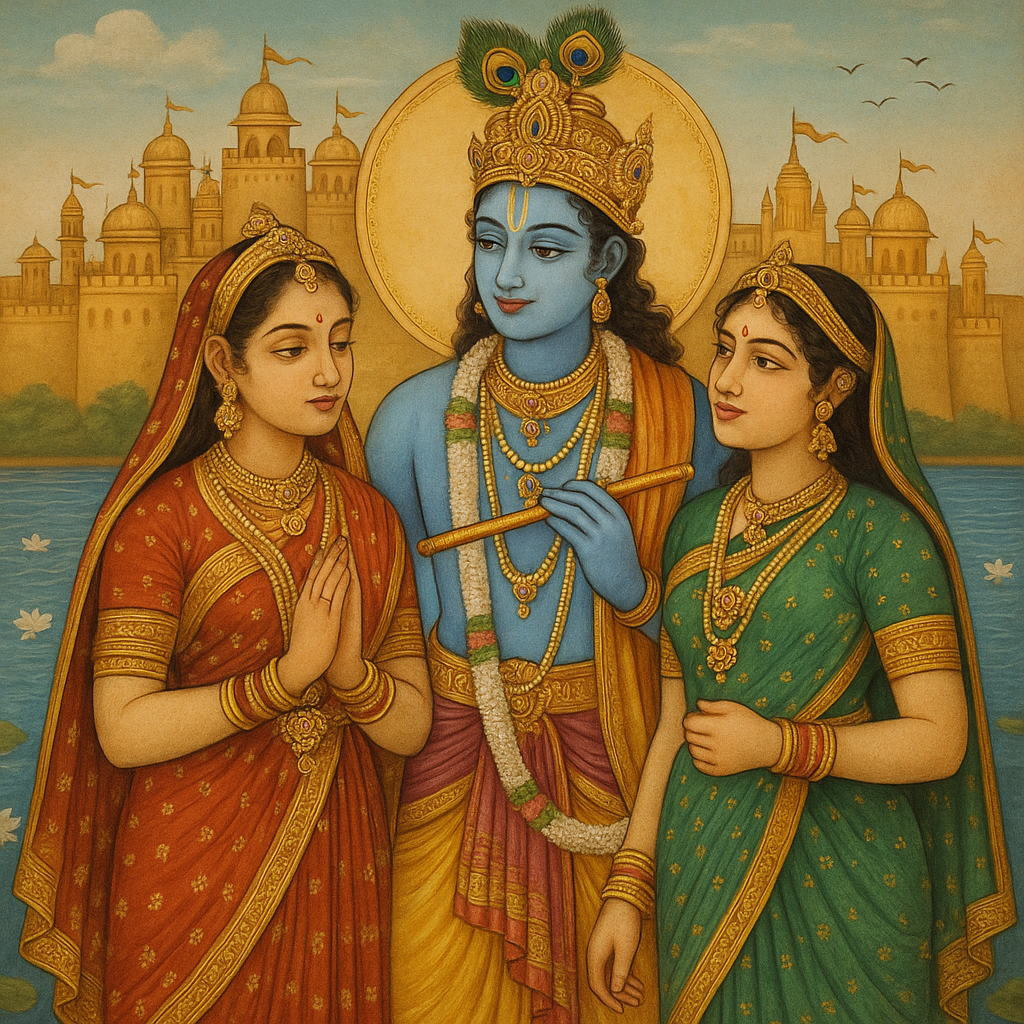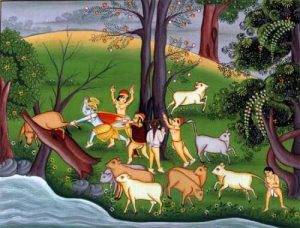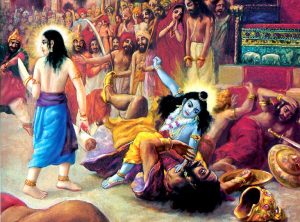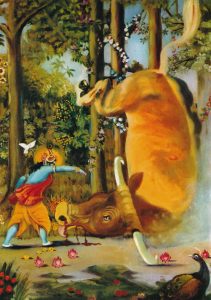The Glorious City of Dvārakā
After His many victorious campaigns, Lord Śrī Kṛṣṇa resided in Dvārakā, a city built by Viśvakarmā, the divine architect. Situated in the ocean and surrounded by golden walls, Dvārakā was the home of the Yādavas and the scene of the Lord’s most intimate and majestic pastimes with His queens.
Among these queens, Śrīmatī Rukmiṇī-devī, the daughter of King Bhīṣmaka, was His first and most devoted wife. Another was Satyabhāmā, the spirited daughter of King Satrājit, known for her love and charming jealousy.
Each queen had her own palace, and Kṛṣṇa expanded Himself into many forms so that He could reside simultaneously with all of them, fulfilling their every wish and exchanging loving, personal pastimes.
Rukmiṇī’s Steady Love and Service
Rukmiṇī was the very embodiment of śraddhā (faith), sevā (service), and prema (love). She rose early to serve Kṛṣṇa personally, offering Him water, garments, and garlands. Her eyes constantly gazed at Him with pure devotion.
Once, as Kṛṣṇa rested in her palace, Rukmiṇī gently fanned Him, her hand trembling in ecstasy. Seeing her pure love, Kṛṣṇa smiled and playfully teased her:
“O princess, you were born of royal lineage, accustomed to kings and warriors. Was I truly the right choice for you—a cowherd raised in Vraja?”
Hearing this, Rukmiṇī was struck like a lightning bolt. Her lotus-like heart, filled with humility, thought Kṛṣṇa was serious. Tears fell from her eyes. She placed her hands on His feet and said:
“O Lord, I am but a maidservant. If You wish to reject me, then please allow me to continue serving You silently from afar…”
Kṛṣṇa was moved by her utter humility. He lifted her gently and wiped her tears.
“O Devi, I only spoke in jest! You are My very heart. Your love binds Me stronger than any chains. Never could I leave you.”
The Lord then placed His garland on her and praised her before the assembly of queens, saying:
“None surpasses the devotion of Rukmiṇī.”
Satyabhāmā’s Loving Pride and Surrender
Satyabhāmā, though equally devoted, was known for her bold spirit and charming self-respect. Once, she approached Kṛṣṇa and said:
“My Lord, why do You give so much attention to Rukmiṇī? Am I not also worthy of Your love?”
Kṛṣṇa, smiling, replied:
“My dear Satyabhāmā, if you wish, you may offer Me your love by placing something on the scale equal to My weight.”
Taking the challenge, she arranged a golden scale and brought heaps of jewels, gold, and precious ornaments, offering all with confidence.
But the scale didn’t move.
No matter how much she added, Kṛṣṇa remained heavier.
Humbled and puzzled, she looked to Nārada Muni, who whispered: “Place a single tulasī leaf with love.”
With trembling hands, Satyabhāmā placed one tulasī leaf, but now with full devotion and surrender.
Immediately, the scale tipped in her favor—Kṛṣṇa’s side rose.
She realized: the Lord is won not by wealth or pride, but by love. She fell at His feet, and Kṛṣṇa embraced her with great affection.
Daily Pastimes in Dvārakā
Each day in Dvārakā was filled with divine pastimes:
- In Rukmiṇī’s palace, Kṛṣṇa would discuss dharma, listen to her sweet words, and accept her offerings.
- In Satyabhāmā’s palace, He would playfully argue, exchange witty words, and delight her with flute melodies.
- He also visited the other queens, each with unique moods of service and love.
Although expanded into 16,108 forms, Kṛṣṇa remained one—the Supreme Lord, tasting varieties of devotional moods (bhāvas) and reciprocating each devotee’s heart.
Lessons to Be Learned:
- Kṛṣṇa is conquered by devotion, not wealth, position, or power.
- Rukmiṇī teaches humility and selfless service, even in the most exalted position.
- Satyabhāmā teaches that loving pride must surrender to pure devotion.
- The Lord expands Himself for His devotees—but the essence is always prema (divine love).
- Even the consorts of the Lord serve as models of pure bhakti, and their stories guide all devotees toward love and surrender.
Origin of the Story: Harivaṁśa Purāṇa – Viṣṇu-parva, Chapters 83–87



